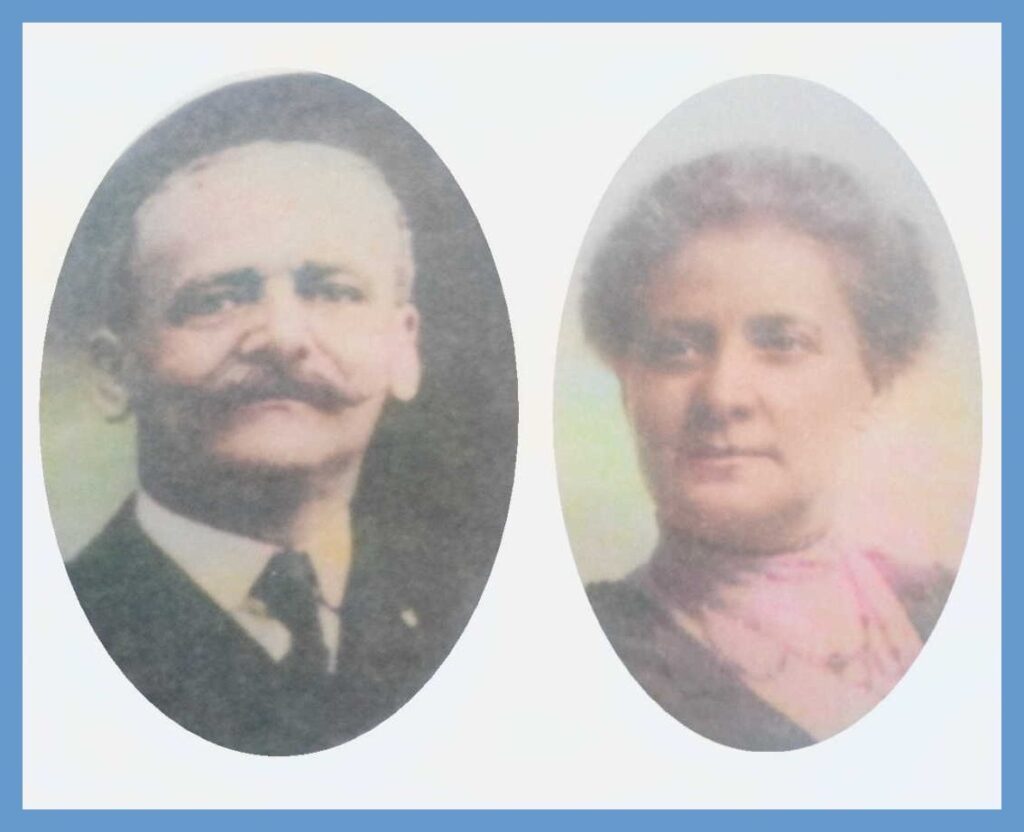Pennsylvania Superior Court Judge Robert E. Woodside, in his biography, My Life and Town, self-published in 1979, devoted several pages to his parents, Robert Woodside (1865-1932) and Ella [Neitz] Woodside (1867-1952). More than just telling about his parents, the Judge describes what Millersburg was like in the early years of the 20th century.
____________________________________________
MY PARENTS
Rob Woodside and Ella Woodside were probably the best known couple in Millersburg during the first years of the 20th century. Rob was postmaster, the one residen with whom every person in town did business. Mail carriers had not yet come to small towns. Lacking mail deliveries, everybody went to the post office to receive and post mail.
Furthermore, the postmaster in those days was more than a mere handler of mail. He was the local representative of his political party and the town’s contact with its congressman. He was the federal government’s local representative. Any person having business with the federal government started with the postmaster who dispensed such information and government forms as were available. This was not a burde. The was not a burden. The federal government was not then concerned with the every act and need of its citizens. There wasn’t even an income tax!
Rob was more competent than confident. He would not have sought the position had not Ella promised to help in the office. Thus it happened that she, too, dealt with the townsfolk. Shem along with Rob and the assistant postmaster “Cush” Frank, prepared the outgoing mail to be carried away by ten trains each day and sorted the incoming mail to be handed to the citizens at the general delivey window, or placed in the boxes for those who could afford that convenience.
when the factory whistles blew at 5:30 in the evening marking the end of an eleven hour work day for those making shoes, tools, brooms, shingles and fifth wheels, Rob, Ella and “Cush” prepared tor the lines which formed at the three windows. Ella often worked late in the evening preparing the necessary reports on the stamps, penny postcards and two-cent envelopes which had been sold, the money orders which had been written, and the letters which were unclaimed for thirty days.
The post office was also the town’s information center. There strangers learned where people lived, worked and loafed. Houses, then without street numbers, had to be described to those seeking to find a resident. With no televisions, radios, few telephones, and only early morning newspaper printed the day before, the post office became the center to which such news as the sinking of the Maine, the big fire in Baltimore, the death of President McKinley, and many lesser items, was relayed by the telegraph operator and dispensed to the general public.
Twice a day the weather report was received by mail from the weather bureau and posted in the lobby. Although many natives relied upon the almanacs, nearly everyone glanced at the weather report before leaving the post office. One very hot day in July the weather report did not arrive. Ella, always full of fun, posted an old January report predicting snow. Although producing laughs and interesting remarks, the hoax would have soon been forgotten had not unseasonably cold weather arrived that evening and snow flurries been reporte the next day in the higher elevations. Rob enjoyed telling the story during the rest of his life.
The Woodside home and post office were catty-cornered from each other at Center and Market Streets. Nearly everybody passed the corner to go almost anywhere. Within a block were the passenger station, the town park, the express office, the lawyer’s office, the doctor’s office, the pool room, the hotels, two churches, the lodge rooms, a bank, most of the stores, a “movie house” and for a time the only automobile in Millersburg.
The telephone exchange on the second floor of the Pick Building was across Center Street from the Woodside home. During warm weather when the telephone operator, known then a “central,” was fanning at the window, it weas not unusual for a Woodside to call to her from the porch to get his “party” before going to to the phone. After all, it did seem foolish to crank a telephone to get the atention of a a person at whom you were looking and who could understand you better by air-carried sound than crackling wire-carried words.
Ella had an insatiable curiosity and a boundless interest in people. Whenever weather and her busy schedule permitted, she sat on the front porch and talked to everyone who would stop. If they conversed better in Pennsylvania Dutch, as most of the farmers and many older people could, she would speak their language. She enjoyed and told jokes in Pennsylvania Dutch because “they are always so much funnier than jokes told in English.”
Many people sought her advice on any number of subjects, which she gave enthusiastically. She was a combination of fashion expert (before marriage she operated a millinery story for which she made all the hats), art teacher (she studied painting in Harrisburg), business advisor (she was a successful merchant before she was twenty), theologian (her father and grandfather were ministers and she herself was a fluent speaker at religious meetings), and family counselor (she had a happy home). I suppose today she would have been charged with practicing psychiatry, medicine and law without a license.
She was intelligent, personable and good looking. The railroad station agent told me he watched them come and go for many years, and that Rob and Ella Woodside when they left on their wedding trip trip they were the best looking couple to ever got on or off a train in Millersburg….
____________________________________________________
Portraits (later colorized) from My Life and Town
Corrections and additional information should be added as comments to this post.
